八年级英语Unit3
人教版八年级上册英语Unit 3知识点梳理及语法讲义(教师版)

八年级上册英语Unit 3知识点与语法精讲精练词汇梳理(一)完成单词梳理:名词:1. competition比赛;竞赛 2. mirror 镜子 3. kid 小孩;年轻人4. grade 成绩等级5. hand 手6. saying 谚语;格言7. heart 内心;心脏8. fact 现实;事实9. information 信息;消息10. arm 手臂;上肢动词:1. win 获胜;赢 2. care 在意;关心 3. should 应该;应当4. reach 伸手;到达5. touch 感动;触摸6. break 损坏7. share 分享;共享;共用副词:1. loudly 喧闹地;大声地;响亮地 2. quietly 轻声地;轻柔地;安静地3. clearly 清楚地;清晰地;明白地4. truly 真正;确实形容词:1. outgoing 爱交际的;友好的;外向的 2. hard-working工作努力的;辛勤的3. fantastic 极好的;了不起的4. talented 有才能的;有才干的5. serious 严肃的;稳重的6. necessary 必需的;必要的7. loud 响亮的;大声的8. similar 相像的;类似的9. primary 最初的;最早的兼类词:1. both (adj/pron)两个;两个都2. better (adj/adv)较好的(地);更好的(地)3. which (pron/adj)哪一个;哪一些4. though (adv)不过;可是;然而(conj)虽然;尽管;不过5. laugh (v)笑;发笑(n)笑声(二) 词汇变形小结:1. good/well (adj/adv. 好的) — better (比较级) — best (最高级)2. loud (adj. 大声的) — loudly (adv.喧闹地)3. quiet (adj. 安静的) — quietly (adv. 安静地)4. competition (n. 竞争;比赛) — compete (v. 竞争;比赛)5. clearly (adv. 清楚地;清晰地) — clear (adj. 清楚的;清晰的)6. win (v. 赢;获胜) — won (过去式) — winner (n. 获胜者)7. talented (adj. 有才能的) — talent (n. 才能;天赋)8. truly(adv. 真正;确实) — true (adj. 真正的) — truth (n. 真实;真相)9. care(v. 在意;关心) — careful (adj. 认真的;细心的)10. serious(adj. 严肃的;稳重的) — seriously (adv. 严重地;严肃地)11. say(v. 说) — saying (n. 谚语;格言)12. touch(v. 感动;触摸) — touching (adj. 令人感动的) — touched (adj. 感动的)13. break(v. 破坏) — broke (过去式)【练一练】用所给词的适当形式填空1.Class Six won (win) the basketball game but our class lost the game.2.My friend likes telling jokes. He often makes us laugh (laugh)happily.3.Be quiet (quietly)! I have something important to tell you.4.I think Linda dances better (well) than Kate.5.Students can’t speak loudly (loud) in the library.6.Although he is only two years old, he can speak clearly (clear).7.The teacher told us to find out some information (information)about our country and share it next week.8.I’m truly (true) sorry that things had to end like this.st night we saw a movie and it made us touched (touch).10.I don't think differences (different) are important in a friendship.(三) 短语攻关:care about关心;在意be talented in 在……有天赋both...and...……和……都play the drums 敲鼓the singing competition 歌唱比赛be similar to 与……相像的bring out 使显现the same as 和……相同be different from与……不同as long as 只要in fact 事实上primary school 小学get good grades 取得好成绩have fun doing sth 做某事很开心make sb do sth 让某人做某事want to do sth 想要做某事make friends 交朋友be like 像……一样知识点梳理1.Both Sam and Tom can play the drums, but Sam plays them better than Tom. 萨姆和汤姆都会敲鼓,但是萨姆比汤姆敲得好。
八年级上册英语知识点总结unit3

八年级上册英语知识点总结unit3八年级上册英语知识点总结Unit 3Unit 3主要涉及关于语法、单词和短语方面的知识点。
以下是这个单元的详细内容。
句型1. 主语+be+形容词:这种句型用于表达人或事物的特征或状态。
例如:The weather is nice today. (天气今天很好。
)2. There be+名词单数/复数:这种句型用于表达某物或某人存在或发生。
例如:There are some books on the shelf. (书架上有一些书。
)3. 主语+动词(否定式)+其他。
例如:He doesn't like basketball. (他不喜欢篮球。
)4. 动词+宾语+间接宾语:这种句型用于表达给某人或某物做某事。
例如:I bought her a gift. (我给她买了一份礼物。
)时态1. 现在完成时:这种时态用于表达从过去某个时间点持续到现在的时间。
例如:I have read this book before. (我以前读过这本书。
)2. 现在完成进行时:这种时态用于表达从过去某个时间点开始持续到现在一直在进行的某个动作。
例如:I have been studying English for eight years. (我已经学了英语八年。
)单词和短语1. 词汇: 这个单元主要涉及关于天气和自然界的词汇,如:cloudy, sunny, rainy, windy (云,阳光,雨,有风). 另外,也包括其他主题的词汇如:wool, cotton, leather, clothes, bag (羊毛,棉花,皮革,衣服,袋子).2. 短语: 一些常用短语也在这个单元讨论,比如:take photos, go skiing, go fishing, go hiking, take a walk (拍照,滑雪,钓鱼,远足,散步).以上便是八年级上册英语知识点总结unit3的全部内容。
八年级上册人教版英语unit3知识点

八年级上册人教版英语unit3知识点Unit3主要讲述了有关时间和计划的相关表达。
本篇文章将为大家归纳整理Unit3中的主要知识点,帮助大家更好地学习和掌握英语。
I. 时间的表达1. 时间的基本表达:- 时间数字+时间单位:例如:8:00 (eight o'clock)、3:15 (three fifty)。
- a.m./p.m.:英语中用a.m.表示上午,p.m.表示下午。
例如:9:00a.m.(nine o'clock in the morning)、7:30p.m.(seven thirty at night)。
2. 时间段的表达:- 表示时间段的连词有:from…to/ between…and/ from…till/ between…and/ from… until等,例如:from 9:00 to 11:00/ between 1:00 and 3:00/ from Monday to Friday。
- 时间段的表达还可以用“… past…” 和“to…”来表示时间段的前后两个端点,例如:It's twenty-five past nine。
It's a quarter to ten。
3. 时间表达中常用的词汇:- minute(分钟)/hour(小时)/day(天)/week(周)/month (月)/year(年)- date(日期)/weekend(周末)/weekday(工作日)/holiday(假期)/vacation(假期)II. 计划的表达1. 表示计划的常用句型:- What are you going to do…? 你打算做什么?- I'm going to… 我打算……- I'm not going to… 我不打算……- What's your plan for…? 你什么时候做什么?- My plan for… is… 我计划在……做……2. 常见的时间状语和频率副词:- tomorrow(明天)/next Monday(下周一)/next month(下个月)/next year(明年)- once a week(每周一次)/twice a month(每月两次)/three times a year(每年三次)- on weekends(在周末)/in the evening(在晚上)/in the morning(在早上)- every day(每天)/always(总是)/sometimes(有时)/never (从不)III. 阳历和阴历的表达1. 阳历的表达:阳历是指以地球绕太阳运行一周为一年的历法,一般是指公历。
人教版八年级英语上册Unit 3 《I’m more outgoing than my sister

You are taller than me,
but I’m thinner than you.
You are smarter than me,
but I’m funnier than you. more outgoing more friendly more hard-working …
2b
Listen again. How are Tina and Tara different? Fill in the boxes.
Lead in
接龙
幻灯片上单词或短语出现时,同 学应迅速读出并说出中文意思。
每人一词,按行/列依次接龙,3秒 内说不出,此行/列同学即失去此答 题机会,下一行/列同学接续。
Presentation
Description Words for People 描述人的形容词
tall
short
Jack
2d
Julie: The one with shorter hair. I think she sang more clearly than Nelly. Anna: Yes, but Nelly danced better than Lisa. Julie: You can tell that Lisa really wanted to win, though. Anna: Well, everyone wants to win. But the most important thing is to learn something new and have fun.
D. interested
Tina …
________________
is__fr_i_e_n_d__li_e_r_a__n_d__
英语八年级下册unit3知识点

英语八年级下册unit3知识点英语八年级下册Unit3主要是涉及到旅游及热门景点相关内容。
在这一单元中,我们学习了许多关于出行的单词和词组,同时也学习了旅游方面的文化知识。
下面,本文将围绕这些知识点,总结归纳出本单元的核心知识点。
第一部分:旅游方面的单词和词组1. sightseeing:观光2. destination:目的地3. travel,journey:旅行4. tour:游览5. accommodation:住宿6. transportation:交通7. ticket:票8. guide:导游9. excursion:短途旅游我们应该注意这些单词的正确发音和用法,使自己的英语更加准确清晰。
第二部分:旅游方面的文化知识1. 美食文化:在旅游中品尝当地的美食也是很重要的一部分。
比如在中国,烤鸭和火锅就是很受外国人欢迎的美食。
在日本,则是寿司和生鱼片。
2. 交通文化:在不同国家,交通方式也是各不相同的。
比如在欧洲,大多数人选择步行或骑行,而在中国城市,公共交通比较发达,人们通常乘坐地铁、公交车等。
3. 饮食礼仪:在不同国家,饮食礼仪也是有所不同的。
比如在中国,用餐时要招待客人,避免用筷子顶餐盘等等礼仪问题。
在日本,则更注重吃饭时的细节和仪式感。
第三部分:热门景点在这个单元中我们还学习了关于热门景点的话题。
下面介绍一些世界著名热门景点。
1. 埃菲尔铁塔:法国巴黎的标志性建筑。
2. 自由女神像:位于美国纽约港口,是法国人向美国人赠送的礼物。
3. 金门大桥:连接美国旧金山和马林县,是世界上最著名的桥梁之一。
4. 罗马斗兽场:意大利罗马的古代竞技场,是世界历史上最著名的文化遗产之一。
5. 万里长城:中国的镇国之宝,是目前世界上保存最完好、规模最宏大的古代筑墙工程。
总结:英语八年级下册Unit3,主要涉及旅游方面的单词和词组、旅游方面的文化知识和世界著名热门景点。
我们可以通过学习这些知识点,提高我们的英语交流能力,也可以更好地了解和欣赏不同国家的风土人情。
仁爱版八年级上册unit3知识点
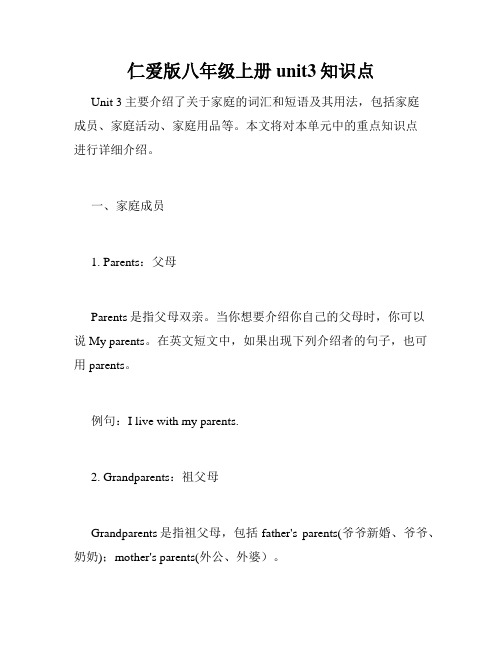
仁爱版八年级上册unit3知识点Unit 3主要介绍了关于家庭的词汇和短语及其用法,包括家庭成员、家庭活动、家庭用品等。
本文将对本单元中的重点知识点进行详细介绍。
一、家庭成员1. Parents:父母Parents是指父母双亲。
当你想要介绍你自己的父母时,你可以说My parents。
在英文短文中,如果出现下列介绍者的句子,也可用parents。
例句:I live with my parents.2. Grandparents:祖父母Grandparents是指祖父母,包括father's parents(爷爷新婚、爷爷、奶奶);mother's parents(外公、外婆)。
例句:I often visit my grandparents.3. Uncle:叔叔/伯伯Uncle可以指叔叔或者伯伯。
在英文中没有明显的区分,只有伯伯(父亲兄弟)、叔叔(父亲弟弟)。
例句:My uncle lives in Canada.4. Aunt:阿姨/伯母Aunt是指阿姨或者伯母,和Uncle一样,并没有明显的区分。
需要根据实际情况进行判断。
例句:My aunt is a teacher.二、家庭活动1. Have a picnic:去野餐Have a picnic是指去外面野餐。
这是一个很好的家庭活动,你可以和家人一起享受阳光和大自然。
例句:We are going to have a picnic this weekend.2. Play board games:玩桌游在家里玩桌游也是一个很好的家庭活动。
这可以增加家庭成员之间的互动,并且在享受游戏的同时,还可以提高智力。
例句:We often play board games on Saturday nights.3. Watch TV:看电视在家里看电视是很多家庭成员都喜欢的活动。
不过需要注意的是,如果看电视时间过长,会影响家庭成员之间的交流。
人教版八年级上册英语unit3知识点及习题

Unit3 I'm more outgoing than my sister.一、要点短语1 . more outgoing更外向16. the other其余的2. As⋯ as ⋯与⋯一⋯17. touch one ’s heart感某人3. the singing competition唱歌比18. be talented in music有音天4. be similar to与⋯相像的 /似的19. be good at擅⋯5. the same as和⋯同样;与⋯ 一致20. be good with擅长与⋯ 相6. be different from与⋯不一样21. have fun doing sth.享受做某事的7. care about关怀;介怀趣8. be like a mirror像一面子22. be good at doing sth擅做某事9. the most important最重要的23. make sb. do sth.某人做某事10. as long as只需;既然24. want to do sth.想要做某事11. bring out使;使表出25. as+adj./adv.的原 +as与⋯一⋯12. get better grades获得更好的成26. It ’ adjs+.+for sb. to do sth.某人来,13. reach for伸手取做某事⋯⋯ 的。
14. in fact事上;上15. make friends交朋友二、要点句子1.He has shorte r hair than Sam. 他的比姆的短。
than比⋯⋯ (用于形容,副的比以后)当两个人或许物行比,要用形容的比。
“比+ than”表示“比 ......更 ...... 。
”一般形容或副的比是在后加-er。
但要注意比的象。
如:I am taller than Jim.我比吉姆高。
人教版八年级上册英语Unit3重点单词与重点短语(附例句)-全

人教版八年级上册英语Unit3重点单词与重点短语(附例句)Unit 3 I'm more outgoing than my sister.【重点单词】outgoing ['aʊtɡəʊɪŋ] adj. 外向的The little girl is outgoing and lively.better ['betə(r)] adj. & adv. (good和well的比较级) 较好的(地);更好的(地)Tom is better at mathematics.loudly ['laʊdli] adv. 喧闹地;大声地①Xiao Ming is talking loudly in the classroom.②You should read English aloud in the morning声地;响亮地quietly ['kwaɪətli] adv. 轻声地;轻柔地;安静地He walked quietly into the bedroom.hard-working [ˌhɑː(r)d'wɜːkɪŋ] adj. 工作努力的;辛勤的He is a hard-working girl.Xiao Ming is a hard-working worker.competition [ˌkɒmpə'tɪʃn], [ˌkɑːmpə'tɪʃn] n. 比赛;竞赛;竞争There will be a math competition in our school tomorrow.I won the first prize in the painting competition.fantastic [fæn'tæstɪk] adj. 极好的;了不起的You look fantastic in that dress.你穿那件连衣裙真好看。
八年级下册英语_Unit3_第三单元笔记+练习
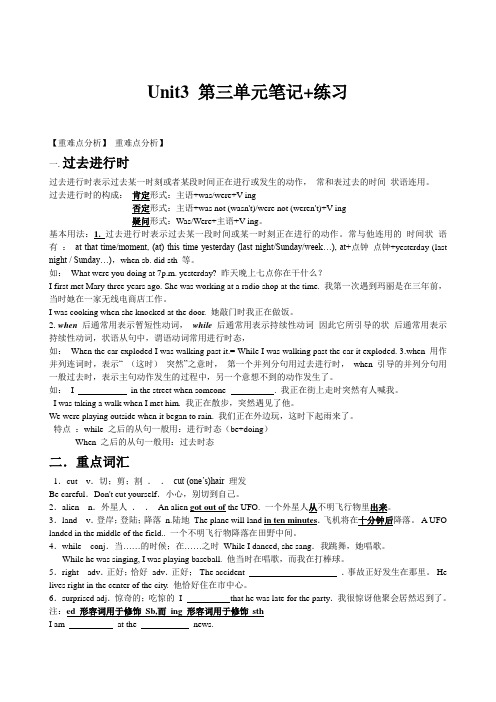
Unit3 第三单元笔记+练习【重难点分析】重难点分析】一.过去进行时过去进行时表示过去某一时刻或者某段时间正在进行或发生的动作,常和表过去的时间状语连用。
过去进行时的构成:肯定形式:主语+was/were+V-ing否定形式:主语+was not (wasn't)/were not (weren't)+V-ing疑问形式:Was/Were+主语+V-ing。
基本用法:1.过去进行时表示过去某一段时间或某一时刻正在进行的动作。
常与他连用的时间状语有:at that time/moment, (at) this time yesterday (last night/Sunday/week…), at+点钟点钟+yesterday (last night / Sunday…),when sb. did sth 等。
如:What were you doing at 7p.m. yesterday? 昨天晚上七点你在干什么?I first met Mary three years ago. She was working at a radio shop at the time. 我第一次遇到玛丽是在三年前,当时她在一家无线电商店工作。
I was cooking when she knocked at the door. 她敲门时我正在做饭。
2.when后通常用表示暂短性动词,while后通常用表示持续性动词因此它所引导的状后通常用表示持续性动词,状语从句中,谓语动词常用进行时态,如:When the car exploded I was walking past it.= While I was walking past the car it exploded. 3.when 用作并列连词时,表示“ (这时)突然”之意时,第一个并列分句用过去进行时,when 引导的并列分句用一般过去时,表示主句动作发生的过程中,另一个意想不到的动作发生了。
八年级英语unit3 重点梳理
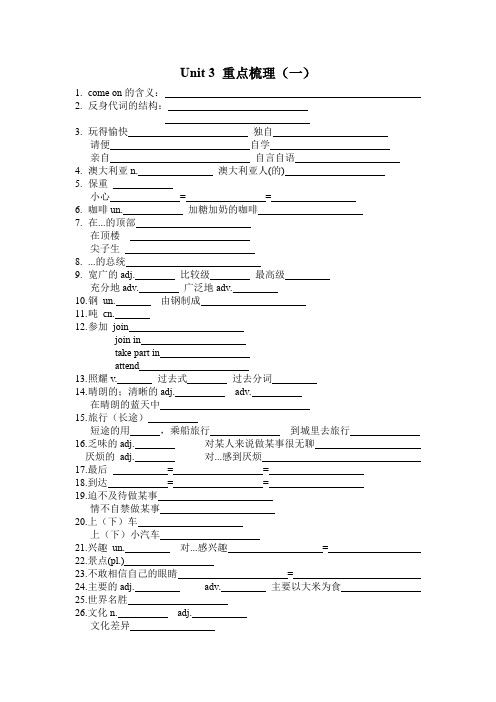
Unit 3 重点梳理(一)e on的含义:2.反身代词的结构:3.玩得愉快独自请便自学亲自自言自语4.澳大利亚n. 澳大利亚人(的)5.保重小心= =6.咖啡un. 加糖加奶的咖啡7.在...的顶部在顶楼尖子生8....的总统9.宽广的adj. 比较级最高级充分地adv. 广泛地adv.10.钢un. 由钢制成11.吨cn.12.参加joinjoin intake part inattend13.照耀v. 过去式过去分词14.晴朗的;清晰的adj. adv.在晴朗的蓝天中15.旅行(长途)短途的用,乘船旅行到城里去旅行16.乏味的adj. 对某人来说做某事很无聊厌烦的adj. 对...感到厌烦17.最后= =18.到达= =19.迫不及待做某事情不自禁做某事20.上(下)车上(下)小汽车21.兴趣un. 对...感兴趣=22.景点(pl.)23.不敢相信自己的眼睛=24.主要的adj. adv. 主要以大米为食25.世界名胜26.文化n. adj.文化差异27.网络n. 前面要加上网搜索信息28.把...放在主页上29.keep fit = = ,构成结构30.with的用法:31.b e made of 加be made from 加be made in 加be made by 加32.反义疑问句由构成,注意33.i nvite的用法其名词为34.交通un. 红绿灯交通拥挤35.代词one 指代the one指代it 指代one 指代36.a s...as的一些常见结构一...就... 尽可能像平时/以前一样巩固练习一.单项选择1.The old man enjoys children kites in the field.A.watching; to flyB.to watch; flyC.watching; flyD.to watch; flying2.-This is really a wonderful party with interesting people and great food.-I’m glad you are .A.liking itB.enjoying yourselfC.at the partyD.lovingst Moday our class went an interesting trip forest.A.on; toB.on; forC.for; forD.to; on4.The memory the trip Huangshan made me happy.A.of; toB.to;ofC.of; ofD.to; to5.It’s quite strange that the man sleeps with his mouth and his eyes .A.closed; openB.closed; openedC.closing;openD.closing; opening6.He slept well all the windows open.A.whenB.whileC.withD.because7.We are doing much better English our teachers’ help.A.in; atB.at; inC.in;withD.at;with8.-Is the tie made silk?-Yes.It’s made Italy.A.from; inB.of; inC.from; ofD.of; from9.This table is made wood and the paper is made wood,too. They were made my town.A.of; from; inB.from; of; inC.in; from; ofD.from;in;of10.Books are made paper while paper is mainly made wood.A.of; ofB.from;fromC.of;fromD.from;of11.There won’t be any concert this Saterday evening, ?A.will there notB.will thereC.is thereD.will it be12.She never tells a lie, ?A.does sheB.doesn’t sheC.does not sheD.isn’t it13.It’s a fine day.Let’s go fishing, ?A.won’t weB.will weC.don’t weD.shall we14.-What are you going to do this weekend,Sue?-I will it in a farmhouse. I want to enjoy farm fresh food and air.A.payB.costC.spendD.take15.-How much did you the coat?-We thirty-six thousand yuan.A.spend; pay forB.pay for; cost forC.pay for; paidD.take;pay16.When they the small village, it was already dark.A.gotB.reachedC.cameD.arrived17.When Mr. Liu this morning, nobody was in the classroom.A.arrivedB.got toC.came toD.reached18.-When did your uncle arrive China?-He got to Guangzhou the morning of the 16th of April.A.at; inB.in; inC.to;onD.in;on19.The group of soldiers(战士) arrived a small town a rainy morning.A.at; onB.at; inC.in; onD.in; in20.The driver is helping the old man the car.A.for getting onB.for getting offC.get out ofD.get in21.During May 1st and October 1st holidays, there are a lot of people travel to the places of great .A.wanting to;interestB.wanting;interestC.want to;interestingD.want to;interested22.The story was really and everybody was in listening to it.A.interesting;interestingB.interested;interestedC.interested;interestingD.interesting;interested23.-Which jackets are yours?-Let me see. in the hall closet.A.What areB.They areC.The jacketsD.The ones24.-Do you need my pen?-No,thanks. I have got .A.a oneB.thatC.oneD.ones25.-Did you find your pen yesterday?-Yes, I found .A.itB.oneC.the oneD.that one26.Sorry, my pen .But you can buy in that shop.A.isn’t at home; itB.is at home; itC.isn’t here;oneD.is here;one27.Your digital watch is quite nice.Where did you buy ? I want to buy .A.one;oneB.it; itC.it; oneD.one; it28.-The classroom is clean it was yesterday.-Sorry, I forget to clean it.A.as; asB.so; asC.not so; asD.more; than29.Tom doesn’t like the film .but his parents like .A.himself; itB.itself; themselvesC.itself;itD.himself;themselves30.You will find as you read this book that you just can’t keep some of these storeis to.You will want to share them with a friend.A.itselfB.yourselfC.himselfD.themselves.二.翻译1.中国是一个历史悠久的国家。
人教版八年级英语上册Unit3知识点精讲

Unit 3 I’m more outgoing than my sister.一、词汇应用1.play the drums 敲鼓2.the singing competition 歌唱比赛3.learn something new 学一些新东西4.have fun 玩得开心;过得愉快5.be talented in 在……方面有天赋6.the same as 和……相同;与……一致7.care about 关心;在意8.a good listener 善于倾听的人9.make friends 交朋友10.as long as 只要;既然11.be different from 与……不同;与……有差异12.bring out 使显现;使表现出13.get good grades 取得好成绩14.in fact 确切地说;事实上;实际上15.break one's arm 摔断了某人的胳膊16.be similar to 与……相像的、类似的17.primary school 小学18.be good with 善于应付……的;对……有办法19.be good at (doing) sth. 擅长(做)某事20.help (to) do sth. 帮忙做某事21.make sb. do sth. 使某人做某事22.A good friend is like a mirror. 好朋友就像一面镜子。
23.Friends are like books — you don't need a lot of them as long as they're good.朋友如书,不在多而贵在好。
24.A true friend reaches for your hand and touches your heart.一个真正的朋友是在需要时给你帮助,使你感动。
25.She's always there to listen. 她随时都能够听我倾诉。
八年级下册人教版英语unit3知识点
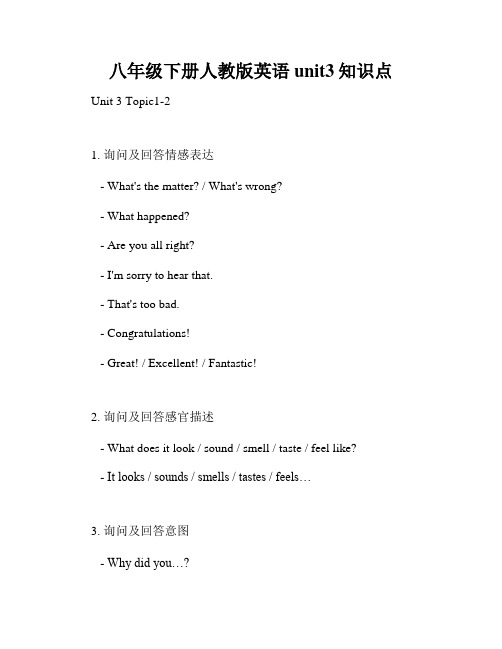
八年级下册人教版英语unit3知识点Unit 3 Topic1-21. 询问及回答情感表达- What's the matter? / What's wrong?- What happened?- Are you all right?- I'm sorry to hear that.- That's too bad.- Congratulations!- Great! / Excellent! / Fantastic!2. 询问及回答感官描述- What does it look / sound / smell / taste / feel like?- It looks / sounds / smells / tastes / feels…3. 询问及回答意图- Why did you…?- What are you going to …?- What do you intend to…?- I intend to… / I plan to…4. 问路及指路,口语表达中熟悉的方向词汇- Excuse me, could you tell me the way to…?- How can I get to…?- The nearest bus stop / subway station / bank / post office is… - It's on the left / right / opposite…Unit 3 Topic 3-41. 表达偏好及兴趣- Would you like…?- What kind of…do you like?- Do you prefer…to…?- I'm into…- I'm fond of…- I enjoy…2. 指出和辨认物品及人物(描述外貌和服装)- What does he / she look like?- He / She has…(描述头发颜色、眼睛、身材特征、穿戴等)3. 询问及描述活动安排- What are you going to do…?- What will you do…?- I'll…4. 描述天气- What's the weather like today?- It's sunny / cloudy / rainy / snowy / windy…- It's hot / warm / cool / cold…Unit 3 Topic 5-61. 表示和理解时间和星期- What time is it?- What's the date today?- What day is it today?- How many days are there in a week?- What do you usually do on weekends?2. 描述行程及活动- Tomorrow, I'm going to…(描述行程)- On Monday / Tuesday / Wednesday…, I usually… - In the morning / afternoon / evening / at night…, I…3. 询问及回答感受- How do you feel?- I feel…(描述感受)4. 描述位置- Where is the…? It's…(描述方位)以上是八年级下册人教版英语unit3的知识点总结,有效巩固这些知识点,可以让你在英语学习中更加得心应手。
人教版八年级上册英语unit3知识点及习题
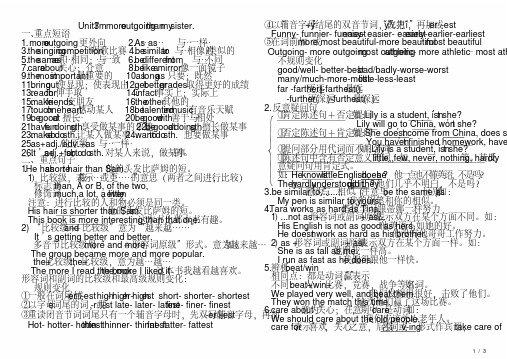
Unit3I 'mmore o utgoing than my sister.一、重点短语1.more outgoing 更外向 2.As …as …与…一样…3.the singing competition 唱歌比赛4.be similar to 与…相像的/类似的5.the same as 和…相同;与…一致6.be different from 与…不同7.care a bout 关心;介意8.be like amirror 像一面镜子9.the most important 最重要的10.a s long as 只要;既然11.b ring o ut 使显现;使表现出12.g et b etter grades 取得更好的成绩13.r each for 伸手取14.i nfact 事实上;实际上15.m ake friends 交朋友16.t he other 其他的17.t ouch one ’sheart 感动某人18.b e talented inmusic 有音乐天赋19.b e good a t 擅长…20.b e good w ith 善于与…相处21. have f un doing s th.享受做某事的乐趣22.b e good a t doing s th 擅长做某事23.m ake sb.d o sth.让某人做某事24.w ant to do sth.想要做某事25.a s+adj./adv.的原级+as 与…一样…26.I t ’s+adj.+for sb.t o do sth.对某人来说,做某事……的。
二、重点句子1.He has shorte r hair than Sam. 他的头发比萨姆的短。
1)比较级,表示“较……”或“更……”的意思(两者之间进行比较),标志词than, A or B, of the two,修饰词much,a lot, a little ,even ;注意:进行比较的人和物必须是同一类。
八年级初二英语unit3知识点
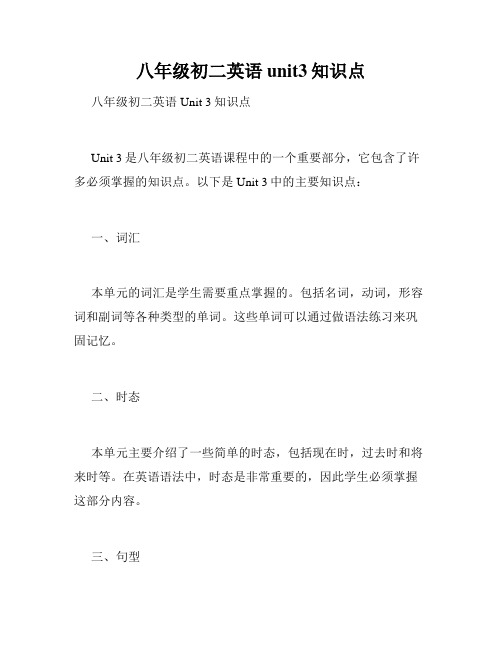
八年级初二英语unit3知识点八年级初二英语Unit 3知识点
Unit 3是八年级初二英语课程中的一个重要部分,它包含了许多必须掌握的知识点。
以下是Unit 3中的主要知识点:
一、词汇
本单元的词汇是学生需要重点掌握的。
包括名词,动词,形容词和副词等各种类型的单词。
这些单词可以通过做语法练习来巩固记忆。
二、时态
本单元主要介绍了一些简单的时态,包括现在时,过去时和将来时等。
在英语语法中,时态是非常重要的,因此学生必须掌握这部分内容。
三、句型
本单元主要介绍了一些基本的英语句型,例如祈使句,疑问句等。
学生需要掌握这些句型,并且在实际使用中熟练运用。
四、语法
本单元主要介绍了几种基本的语法规则,包括名词性从句,简单句,复合句等。
语法规则是英语学习的重点,因此学生需要认真学习这部分内容。
五、阅读
阅读是学习任何语言都必须掌握的技能之一。
本单元提供了一些适合初学者阅读的材料,学生需要通过阅读来提高自己的英语水平。
六、写作
本单元还包括一些写作练习,例如写作话题和写作明信片等。
这些练习是帮助学生提高编写英语文章的能力,并通过书写来加深对词汇和语法的理解。
综上所述,Unit 3是八年级初二英语学习的重要部分,它包含了许多必须掌握的知识点。
学生需要耐心学习并反复练习,以便更好地掌握这些知识点并提高自己的英语水平。
人教版八年级英语上册课件:Unit 3(共38张PPT)
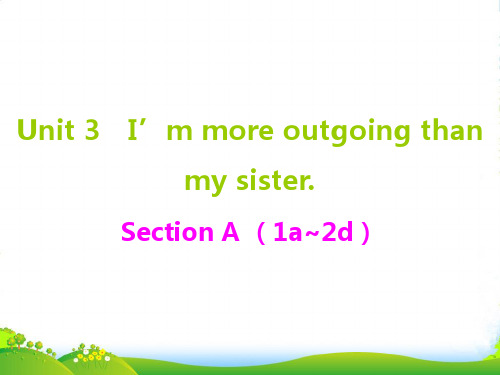
They _____ playing volleyball.
A. both are; both like
B. are both; like both
C. are both; both like
D. both are; like both
要点梳理
3 win的用法;though的用法 【教材例句】You can tell that Lisa really wanted to win, though. 不过,你能感觉到丽莎是真的想赢得比 赛。(教材第18页) 【用法1】win用作动词,意为“赢;获胜;得到成 功”。在用作及物动词时,它的宾语往往是奖品、奖学 金、名誉、财产、战争或运动等。win的过去式和过去 分词均为won。
要点梳理
【举例】Please hold both my hands in yours. 请握 住我的双手。(both用作形容词)
We both have too much work to do. 我们俩有 太多的工作要做。(both用作代词)
We have both passed the mid-examination. 我 们俩都通过了期中考试。(both 用作副词) 【辨析】both指“两者都”, all指“三者或三者以上都” 。如:
要点梳理
易混词 (组) 辨析 loudly, loud与aloud的区别 【教材例句】Tina is taller than Tara. And she also sings more loudly than Tara. 蒂娜比塔拉高,而且她 唱歌也比塔拉声音大。(教材第17页)
要点梳理 【要点思维导图】
Although he is more outgoing than you, you are smarter than him. 尽管他比你外向,可你比他聪 明。
八年级上册英语unit3单词知识点
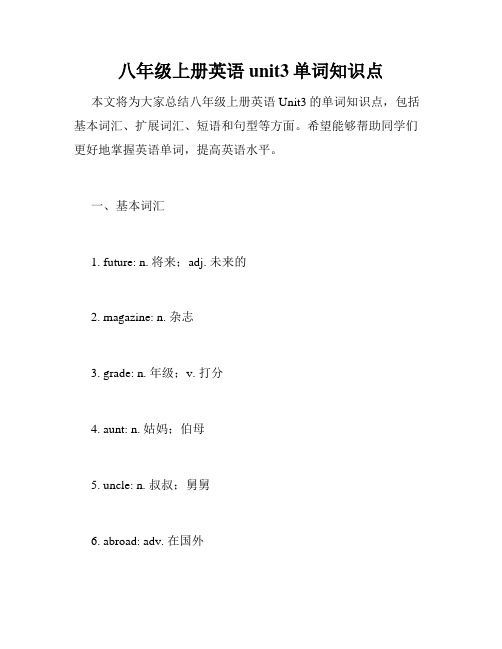
八年级上册英语unit3单词知识点本文将为大家总结八年级上册英语Unit3的单词知识点,包括基本词汇、扩展词汇、短语和句型等方面。
希望能够帮助同学们更好地掌握英语单词,提高英语水平。
一、基本词汇1. future: n. 将来;adj. 未来的2. magazine: n. 杂志3. grade: n. 年级;v. 打分4. aunt: n. 姑妈;伯母5. uncle: n. 叔叔;舅舅6. abroad: adv. 在国外7. expensive: adj. 昂贵的8. hope: v. 希望;n. 希望9. surprise: v. 使惊讶;n. 惊喜10. beach: n. 海滩二、扩展词汇1. foreign: adj. 外国的2. exam: n. 考试3. cheerful: adj. 愉快的4. colorful: adj. 多彩的5. impatient: adj. 不耐烦的6. thrilled: adj. 激动的7. relaxed: adj. 放松的8. traditional: adj. 传统的9. successful: adj. 成功的三、短语1. be interested in: 对......感兴趣2. be worried about: 担心......3. be fond of: 喜欢......4. look forward to: 期待......5. give up: 放弃......6. be excited about: 对......感到兴奋7. make friends with: 和......交朋友8. have fun: 玩得开心9. take a trip: 去旅行四、句型1. What are you going to do this weekend?2. I'm going to visit my aunt.3. How was your summer vacation?4. It was great! I went to the beach and had lots of fun.5. What do you think of this magazine?6. I think it's very interesting and informative.7. Why are you so excited?8. Because I'm going to have a trip abroad next month.以上就是八年级上册英语Unit3的单词知识点总结。
- 1、下载文档前请自行甄别文档内容的完整性,平台不提供额外的编辑、内容补充、找答案等附加服务。
- 2、"仅部分预览"的文档,不可在线预览部分如存在完整性等问题,可反馈申请退款(可完整预览的文档不适用该条件!)。
- 3、如文档侵犯您的权益,请联系客服反馈,我们会尽快为您处理(人工客服工作时间:9:00-18:30)。
八年级英语上册1—3单元复习纲要短语1.____________多久一次2.____________ 几乎不3.____________ 至于,关于4.____________ 去看电影5.____________ 每天6.____________一月两次7.____________ 上网8.____________的结果9.____________ 读英语书10.____________ 垃圾食物11.____________ 多少12.____________ 当然13.____________照顾,照看14.____________. 想要某人做某事15.____________对……有益16.____________. 尽力做某事17.____________ 保持健康18. ____________ 感冒,受凉18.____________ 有压力的,紧张的19.____________ 此时,现在20.____________ 回来21.____________与…相同22.____________.与….不同23.____________背疼24.____________胃疼25.____________ 躺下休息26.____________看牙医27.____________ 多喝水28.____________感觉好29.____________早起床30.____________ 听音乐31.____________r 传统中医32.____________太多33.____________ 寄宿家庭34.____________.某人随身携带35.____________这次36.____________ 离开37.____________ 骑自行车观光38.____________ 去散步39.____________给建议50. ____________.租碟片给某人____________从某人那租碟片51. ____________拍电影52. ____________问某人某1、When I __________ home, I’ll show you the photos.A. get toB. return toC. get backD. return back2. I decide ______ go fishing with Sally.A. onB. toC. atD. in3. The poor man ate a big breakfast ______he said he wasn’t hungry A. as B. because C. though D. for4.—I’m taking a long vacation. I’m going to the Great Wall.—______.When are you leaving?A. Don’t wait.B. That sounds nice.C. Have a good time.D. That’s too bad5. —How long is she staying in Rome ? — _______A. Every week.B. For five daysC. In a yearD. Five kilometers6. —Jim, where ____you_____? —I’m buying a pen.A. is goingB. are doingC. is doingD. are going7. He leaves _____the airport at 8:00A. inB. offC. onD. for8. I ____ the headmaster is going to London next week.A. hearB. hear ofC. hear aboutD. hear from9. I want to ____a car to drive for vacation. I should pay for 200 yuan a day.A. rentB. buyC. borrowD. sell10. _____to give the letter to Mr Wang .It’s very important.No, I won’t.A.RememberB. Don’t forgetC. Be sureD. Make sure12. Mr Green with his wife _____sitting there when I came in.A. isB. was C are D. were13 . —Look at the people in the lake. They are playing happily. Let’s_____, too—Good idea!A. go hikingB. go campingC. go skatingD. go boating15. —I hit a tree on the way to school.—I’m sure that you _____have been driving too fast.A. needB. shouldC. willD. must16 —Did you give Nick a call?—I didn’t need to,______ I will see him soon.A. whenB. thoughC. untilD. because17. I’m do ing my homework______. I have no time to play with you.A. just now B at the moment C, for a moment D. a moment ago18. .He_____ carefully, but_____ nothing.A. heard; heardB. heard, listened .C. listened; listened.D. listened. heard19 .Don’t b e angry ______ that little boy.A. atB. about.C. withD. to20. _______ the help of man-made satellites, we can know what the weather will be like in thenext few days.A. UnderB. WithC. usingD. By21 . The dress _______ smooth and soft.A. feltB. feelsC. is feltD. is feeling22. —Do you think it will rain tomorrow?—______.Because farmers need rain very muchA.I think soB.I hope soC. I’m afraid soD. I hop e not23. _______it is rainy today, _______he still works outside.A. Although, butB. But , althoughC./, althoughD. Although, /24. The doctor always asks him to take_______ .A. more exerciseB. more exercisesC. many exerciseD. many exercises25. —Can I help you ?—I bought this watch yesterday, but it ______work.A. won’tB. didn’tC. doesn’tD. wouldn’t26. My physics teacher said that light _____ faster than sound.A. travelB. travelsC. traveledD. traveling27. Tom is strong and he ______ to school every day.A. walkedB. walksC. will walkD. has walked28 . Life in the countryside is quite ________ that in modern cities.A. the sameB. different from C full of D. different as完型填空London is a beautiful city. It is very large. The Thames River runs 42 the city from west to east. So the city has 43 parts: the South and the North. In the North, there are important buildings, shops, big parks and interesting places.The weather in London is good. In winter it is not very cold and in summer it is not very hot 44 the city is near the sea. People say 45 London is a foggy city and itoften rains. It is true.Last year, when I 46 in London I met one of the 47 fogs in years. You could hardly see your hand in front of your face. Cars and buses moved along with their lights on. When evening came, the weather got 48 worse. The fog was as thick as milk. 49 the buses and cars stopped. I had 50 an important meeting on the other side of the town, but it was impossible to find a car. I had to get there 51 . 1. A. about B. through C. in D. along2. A. four B. six C. five D. two3. A. because B. so C. but D. or4. A. what B. where C. that D. which5. A. were B. am C. be D. was6. A. big B. bigger C. bigest D. biggest7. A. wore B. even C. very D. some8. A. All B. Each C. Every D. None9. A. to join B. to go to C. take part in D. join in10. A. by car B. by bus C. on foot D. on the foot Jack lost(丢失)his Job last week. It was difficult for him to find another 1. 2told him that it was possible(可能的)to get a new one in a town two hundred kilometers 3 . He decided to get there 4. So he went to the railway station and got 5 a train. He was the only one in the car(车厢). The train started. Suddenly a man came in 6 a gun(枪)and said to him,“Your money7your life!” Jack sat there without 8 up.“I 9 any money,”Jack answered.“Then why are you so afraid of me?”the man asked ang rily.“Because I 10you were the conductor, and I didn’t buy a ticket,”answered Jack.()1、A.work B.jobs C.ones D.one()2、A.Nobody B.Somebody C.Anybody D.No one()3、A.from B.farther C.away D.off()4、A.by bike B.on foot C.by train D.by bus()5、A.off B.on C.up D.to()6、A.with B.has C.have D.there was()7、A.but B.and C.so D.or()8、A.stands B.standing C.stood D.stand()9、A.don’t ha ve B.have no C.didn’t have D.had()10、A.know B.didn’t know C.think D.thoughtDuring the day we work and play, and at night we sleep. Our bodies rest while we are __11__. In the morning we are ready____12___ again. Our bodies grow ____13____ while we are asleep. Children who are tired usually ___14___ sleep. We can get better at our lessons ___15___ we have had plenty of rest. Boys and girls who are eight or nine years old need ten hours of sleep every night. Our bodies need plenty of ____16___ when we sleep. If we do not get enough fresh air, we ____17___ tired when we wake up. While in bed we must not cover our ____18___. Our lungs(肺) need to get enough fresh air. If we ___19___ our windows at night, we can have plenty of fresh air. Cool air is better than warm air. Boys and girls who want to be ___20___ must get plenty of sleep.( )11.A.asleep B. sleep C. rest D. play( )12.A. to work and play B. working and to playC. to work and playingD. working and playing( )13.A. much B. more C. most D. slow( )14.A. can B. may C. need D. must( )15.A. while B. before C. as D. after( )16.A. air B. sun C. water D. food( )17.A.felt B. will feel C. are feeling D. has felt( )18.A. foot B. arm C. head D. body( )19.A. open B. close C. draw D. use( )20.A. happy B. interested C. helpful D. healthy阅读理解AMany students in China are learning English. Some of these students are small children. Others are teenagers(十几岁的青少年). Many are adults. Some learn at school, others study by themselves. A few learn English language (语言)over the radio, on television, or in films. One must work hard to learn another language.Why do all these people want to learn English? It is difficult to answer that question. Many boys and girls learn English at school because it is one of their subjects. They study their own language and maths and English ... Some people learn English because it is useful for their work. Many people often learn English for their higher sutdies, because at college or university(大学) some of their books are in English. Other people learn English because they want to read newspaper and magazines in English.( )21. Many students in China are learning English, aren't they? ____.A. No, they aren'tB. No, they areC. Yes, they areD. Yes, they aren't( )22. If one wants to learn another language well, he must ____.A. learn at schoolB. study by himselfC. work hardD. study hard( )23. The sentence "It is difficult to answer that question" means ____.A. that question is not difficult to answerB. that question is difficult to answer itC. it is difficultly to answer that questionD. it is hard to answer that question( )24. "Their own language" means ____.A. ChineseB. EnglishC. FrenchD. Japanese( )25. What's the Chinese of "study by themselves"?A. 和他们一起学习B. 自学C. 向他们学习D. 通过学习BOnce upon a time, there lived a rich man. He had a servant (仆人). He and the servant loved wine and good food very much. Each time the rich man left his home, the servant would drink the wine and eat up all the nice food in the house. The rich man knew what his servant did, but he hadnever caught his servant doing that.One morning, when he left home, he said to the servant, “Here are two bottles of poison (毒药) and some nice food in the house. You must take of them.” With these words, he went out.But the servant knew that the rich man had said was untrue. After the rich man was away from his home, he enjoyed a nice meal. Because he drank too much, he was drunk and fell to the ground. When the rich man came back, he couldn’t find his food and his wine. He became very angry. He woke the servant up. But the servant told his story very well. He said a cat had eaten up everything. He was afraid to be punished(惩罚), so he drank the poison to kill himself.( )26.In the story, _______ liked wine and good food very much.A. the rich manB. the servantC. both A and BD. neither A and B( )27.The rich man knew that it was _______ that drank the wine and ate up all the nice food.A. the catB. himselfC. nobodyD. the servant( )28.The rich told the servant that there was poison in the two bottles, because ________.A. there was in fact poison in the bottlesB. did not want the servant to drink his wineC. he wanted to kill the catD. he wanted to kill the servant( )29.In fact, _______ ate all the nice food and drank the wine.A. the servantB. catC. the rich manD. nobody( )30.From the story, we know that the servant is very _______.A. lazyB. badC. cleverD. kindCEveryone likes living in a clean and comfortant environment. If the envionment(环境) are bad, it will affect(影响)our body, and make us not feel well. Sometimes we may be terribly ill. At that time we don’t want to work, and we have to stay in bed and rest at home. So the envrionment is very important to us.It’s germs that makes us ill. There are germs everywhere, They are very small and you can’t find them with your own eyes, but you can see them with a microscope(显微镜)They are very small and there may be hundreds of them on a very small thing, Germs can always be found in dirty water. When we look at dirty water under the microscope, we shall see them in it. Germs can also be found in air and dust(灰尘). If you cut your finger, some of the dust from the floor may go into it, and you will have much pain in it. Sometimes the germs will go into all of your boby, and you will have pain everywhere.To keep us healthy, we should try to our best to make our environment become cleaner and tidier. This needs us to act together.31.The writer tell us that________.A. we like working when we are illB. germs can’t live in the water.C. we can’t feel ill if the environment is bad.D. we feel well when the environment is good.32.Germs are________.A. very small things that you can’t see with your eyes.B. the things that don’t effect people.C. the things that you can find with your eyes.D. the things that are very big.33. Where can germs be found? They can be found_________.A. on the small thingB. in air and dustC. only in dirty waterD. everywhere34.How will you feel if germs go into the finger that is cut?A. I will feel nothing.B. I won’t mind.C. I will feel tense.D. I will feel painful.35. From the passage we know that________.A. environment doesn’t affect our lifeB. we don’t need to improve our environmentC. germs may make us illD. if the environment is better, germs will be more.DIf you go into the forest with friends, stay with them .If you don’t, you may get lost. If you do get lost, this is what you should do.Sit down and stay where you are. Don’t try to find your friends. Let them find you. You can help them to find you by stay in one place.There is anther way to help your friends or other people to find you. Give them a signal(信号)outing or whistling (吹口哨) three times. Stop. Then shout or whistle three times again. Any signal given three times is a call for help.Keep on shouting or whistling, always three times togher. When people hear you, they will give two shouts or two whistles. When a signal is given twice, it is an answer to a call for help.If you don’t think that you will get help before night comes, try to make a small room with branches.(树枝)What should you do if you get hungry or need drinking water ? You would have to leave your little branch room to look for something to eat and drink. Don’t just walk away. Pick up small brunches and drop them as you walk so that you can find your way back.The most important thing to do when you are lost ---stay in one place.根据文章判断正(T)、误(F)( )36.If you get lost in the forest, you should walk everywhere to find your friends as soon as possible.(尽快)( )37.You can keep on shouting or whistling always three times toghether for help.( )38.When you hear two shouts or whistles, you know that people will come to help you. ( )39.You can’t go anywhere even when you feel thirsty(口渴的)or hungry.( )40.You can find your way back to your branch room easily without leaving any branches as you walk.EKong Rong was a famous writer during the Han Dynasty(汉朝). He was considerate when he was only four.Kong had five elder brothers and a young brother. One day, their father bought lots of pears. Some of the pears were big and looked good. Some were small and didn’t look so good. The boys were happy and began to choose(选择)some. Kong chose the smallest one. Kong’s father found thisstrange and asked, “Why not choose a bigger one, my son?” Kong answered, “ I am younger. My elder brothers are older and eat more. They should take the bigger ones.”“ But you have a young brother. He should take the smallest one!”“ He is younger and needs more nutrition(营养). He should get a bigger one, too.”Kong’s father was very happy that Kong could be so considerate. He didn’t think of what he himself wanted. He thought of what others wanted first.6. How many kids are there in Kong Rong’s family?A. 5B. 6C. 7D.47. What does “ considerate” mean?A. Always thinking of other people want.B. Only thinking of what oneself wants.C. Always doing bad things.D. Never doing wrong things8. Kong Rong chose the smallest pear because_______.A. he couldn’t eat a big one.B. He liked small ones.C. He wanted his brothers to eat the big ones.D. He wanted to make others happy.9. What was Kong Rong during Han Dynasty?A. A writerB. A painterC. A poetD. A leader10. Which of the following is true according to the story?A. Kong Rong lived in the Tang Dynasty.B. Kong Rong was the youngest boy in his family.C. Kong Rong’s mother died when he was four.D. Kon rong’s father felt very happy about his considerate son.F41. Mary is going to the cinema at seven on ________________.A. Monday eveningB. Wednesday eveningC. Friday eveningD. Sunday evening42. On Wednesday afternoon Mike is going to ___________A. enjoy the concertB. see some friendsC. see a doctorD. have an art class43. Mary is going to ______________ on Wednesday evening.A. have supper with AnnB. have a basketball partyC. study for an examD. watch a basketball match44. Mike’s basketball team party starts at __________on SundayA. 7:30 p.m.B. 8:00 p.m.C. 8:30 p.m.D. 9:00 p.m.45. From Mike’s and Mary’s plans we know that they both like ________.A. shoppingB. concertsC. artD. musicA. TV playB. SportsC. Around the worldD. Talk show52. The programme of ________ will let you know much about western countries.A. SistersB. Around ChinaC. Around the worldD. On TV next week53.If you want to know something about tigers, elephants and monkeys, the best programmefor you is ________.A. Around ChinB. Animal worldC. TV playD. Foreign arts54. English classroom is a programme that________.A. lets you know something about classroomB. tells you something about studentsC. lets you know something about school lifeD. teaches you English55. The programme at the end of Channel 2 means ________ on TV next week.A. newsB. programmesC. peopleD. places四.作文近年来,中小学健康问题日益引起人们的关注。
